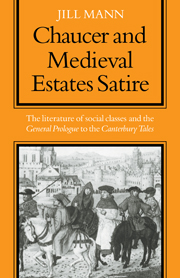Book contents
- Frontmatter
- Contents
- Preface
- List of Abbreviations
- Note on References
- 1 Introduction
- 2 The Anti-Clerical Tradition in Estates Satire
- 3 Estates Ideals
- 4 The Omission of the Victim
- 5 Independent Traditions: Chivalry and Anti-Feminism
- 6 Descriptive Traditions: Beauty and the Beast
- 7 ‘Scientific’ Portraits
- 8 New Creations
- Excursus: The ‘General Prologue’ and the ‘Descriptio’ Tradition
- 9 Conclusions
- Appendices
- A Estates Lists
- B Chaucer, Langland and Gower
- Notes
- Selected Bibliography and List of Works Cited
- Index
B - Chaucer, Langland and Gower
Published online by Cambridge University Press: 23 October 2009
- Frontmatter
- Contents
- Preface
- List of Abbreviations
- Note on References
- 1 Introduction
- 2 The Anti-Clerical Tradition in Estates Satire
- 3 Estates Ideals
- 4 The Omission of the Victim
- 5 Independent Traditions: Chivalry and Anti-Feminism
- 6 Descriptive Traditions: Beauty and the Beast
- 7 ‘Scientific’ Portraits
- 8 New Creations
- Excursus: The ‘General Prologue’ and the ‘Descriptio’ Tradition
- 9 Conclusions
- Appendices
- A Estates Lists
- B Chaucer, Langland and Gower
- Notes
- Selected Bibliography and List of Works Cited
- Index
Summary
Three major writers of the fourteenth century made use of estates material in their works – Gower, Langland and Chaucer. Inevitably we must ask: did they do so independently, or were they acquainted with, and influenced by, each other's work?
The probability that Chaucer had read both Gower and Langland seems, on the face of it, strong. All three poets had connections with London; Gower and Chaucer were personal friends; Piers Plowman was a work sufficiently well-known for its terminology to be used in John Ball's famous letter to the peasants of Essex. The satiric tradition was a rich one before ever these writers put pen to paper, but if Chaucer was thinking of writing an estates piece, it is surely likely that he would have consulted Piers Plowman, the Vox Clamantis and the Mirour de l'Omme to see how their authors handled estates material. In the preceding chapters, features in Chaucer's portraits have often been paralleled in Gower and Langland. I shall now briefly attempt to isolate these parallels, and to consider other evidence of his debt to them.
CHAUCER AND GOWER
Many of the parallels between the Prologue and the Mirour de l'Omme were pointed out long ago by Flügel, and more recently, John Fisher has argued strongly for the influence of Gower on Chaucer.
- Type
- Chapter
- Information
- Chaucer and Medieval Estates Satire , pp. 207 - 212Publisher: Cambridge University PressPrint publication year: 1973



